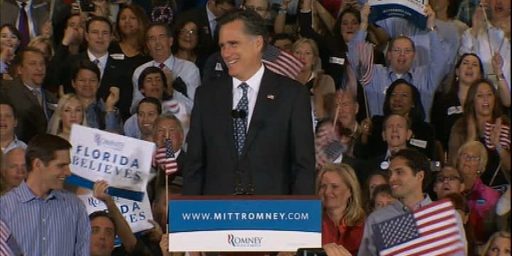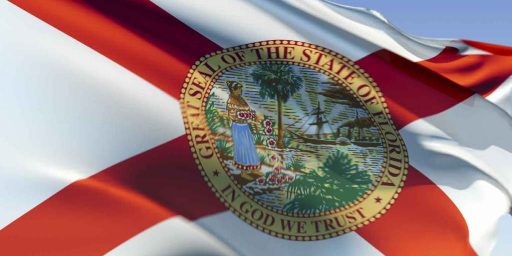Gingrich and the Constitutional Order
Gingrich has some pretty radical ideas about separation of powers.
 Doug Mataconis (also here) and James Joyner have both noted some of Newt Gingrich’s attack on the federal judiciary, and while I do understand that campaigning against “activist judges” and “legislating from the bench” (not to mention attacking the Ninth Circuit) are all standard GOP campaign themes, Gingrich takes these attack several step too far.
Doug Mataconis (also here) and James Joyner have both noted some of Newt Gingrich’s attack on the federal judiciary, and while I do understand that campaigning against “activist judges” and “legislating from the bench” (not to mention attacking the Ninth Circuit) are all standard GOP campaign themes, Gingrich takes these attack several step too far.
First, the normal line of attack is “elect me, and I will appoint the right kind of judges”—which strikes me as a legitimate campaign promise (given that a key presidential power is judicial appointment). However, as Doug has noted, Gingrich is suggesting that he would ignore court decisions with which he disagreed.
It is worth pointing out that one of the hallmarks of underdeveloped democracy worldwide is a weak court system that is either wholly controlled, or simply ignored, by the executive branch. This has been a problem in Latin America, for example, for decades. As counterintuitive as it may seem, a strong and independent court system is essential to a functioning democracy because democracy requires mechanism to protect the rights of minorities and individuals. This is a key function of courts, especially the Supreme Court, given its ability to interpret and enforce the Constitution, including the Bill of Rights.
The easiest example of this is, of course, school segregation and the Brown decision in 1954. Clearly, the majority of the population preferred segregation, and yet it was a clear violation of the fundamental rights of a significant portion of the population. Of course, the rulings that people like Gingrich dislike, such as prohibitions against institutionalized prayer in schools, are also protections of minorities from majority will but since they are often cases where some people would like their will to dominant others, these are considered “legislating from the bench.”
Second, and in some ways more disturbing, is a new (at least I have never heard him utter it before) formulation: the notion that two out of three of the branches should win the day on a given topic.
The Hill reports on a conference call with Gingrich which contained this notion:
When pressed as to whether a president could ignore any court decision he didn’t like, such as if President Obama ignored a ruling overturning his healthcare law, Gingrich said the standard should be “the rule of two of three,” in which the outcome would be determined by whichever side two of the three branches of government were on.
There is no constitutional basis for such a formulation nor is there a constitutional mechanism for determining how to count which two of the three voted in which way. Moreover, what Gingrich is actually looking for here is a veto power over the Supreme Court. If that’s what he wants he needs to advocate for an amendment to the constitution.
Further, the fact of the matter is that the courts are already less powerful than the other two branches. For example: while it is true that all laws passed by Congress are theoretically subject to court review. So, let’s do the math: hundreds of laws are passed each year by the legislature, while only a handful of those will ever be reviewed by the federal courts, let alone the Supreme Court. As such: advantage legislative branch. And while the courts can rule on actions of the executive, they rarely do so (and all reviews are ex post anyway). So, advantage: executive.
Third, and perhaps worst of all, he seems to think that we should forget the whole separation of powers thing all together and make members of the judicial branch subordinate to the legislative.
Here’s a bit from Face the Nation (video here):
SCHIEFFER: One of the things you say is that if you don’t like what a court has done, that Congress should subpoena the judge and bring him before Congress and hold a congressional hearing … how would you enforce that? Would you send the Capitol Police down to arrest him?
GINGRICH: Sure. If you had to. Or you’d instruct the Justice Department to send a U.S. Marshal.
Now, granted (as Gingrich notes in the clip), members of the federal bench can be impeached, but the part he leaves out is that the constitutional standard for impeachment and removal is malfeasance, not disagreement over a ruling.
So, to be clear: Gingrich’s proposals are those of man who, if he is to be taken at his word, would attempt to subvert the basic constitutional order if he were elected president. As such, I am not sure how anyone who claims that what they want is fealty to the US Constitution could support his candidacy. The Tea Party, for example, should be running away from Gingrich en masse.
It is, of course, possible, that all of this is the famous (or is it infamous?) Gingrich penchant to say odd, if not bizarre, things off the cuff for which he will have to backtrack later. Still, as far as traits for a president are concerned, an utter lack of mental discipline is not exactly desirable. At a minimum these suggestions point to an “historian” who, despite his alleged professorial mien really doesn’t understand what he is talking about–at least from an intellectual point of view. Granted, if we interpret this as pure political rhetoric, that’s another issue. But again: if this is pure political rhetoric then it indicts the so-called “constitutionalists” in the GOP if they continue to support Newt.
h/t for the FTN and Hill pieces: Steve Benen.






Gingrich’s suggestion that the executive be able to arrest “radical” judges should they issue decisions that go against popular opinion, if enacted, would not merely lay the foundation for tyranny, but go far toward constructing the edifice. That he can even spout such nonsense should disqualify him from any public office, let alone the presidency.
I’m happy to see he’s rapidly falling in the polls in Iowa and elsewhere. His complete self-destruction cannot come soon enough.
“Further, the fact of the matter is that the courts are already less powerful than the other two branches.”
I think the Citizens United case somewhat disproves that.
Mike
“Third, and perhaps worst of all, he seems to think that we should forget the whole separation of powers thing all together and make members of the judicial branch subordinate to the legislative.”
the Constitution already makes the judicial branch subordinate to the legislative branch, because Congress can impeach judges whenever they feel like it. They don’t even need to be guilty of a crime
that’s one of the reasons everyone freaking out over Gingrich’s comments is so stupid. People think that Congress can subpoena the President but not judges? Congress can impeach judges but not ask them to answer questions or justify rulings? The position taken in this article, and most articles about this, is illogical at best
@MBunge:
Not at all. You are simply using Gingrichian logic here: i.e., if there is a case you don’t like, it proves the tyranny of the courts.
Just a reminder: this is the smartest guy in the GOP…the intellectual…the idea guy.
@Jason Hornbuckle:
This is true, at least in a theoretical sense: and yet as a matter of practicality is quite a bit more complicated than your assertion makes it sound.
This is technically true, btw, of the relationship between the Congress and the President.
The Courts are too powerful for a well-functioning democracy. I would lay primary blame on the political branches for allowing it (e.g., Bush signing a law he opined to be unconstitutional) and leaving it up to the Court system to dispose of their rubbish. The relative unpopularity of Congress makes change difficult, but it would require taking the Constitution seriously and making it a part of the arguments for and against legislation as was the case in the eighteenth and nineteenth centuries. When the Courts overturn a Congressional act, they should be prepared to face criticism.
@Jason Hornbuckle: Gingrich is very specifically _not_ talking about impeachment here – he is talking about using intimidation and harassment on judges who make legal rulings he personally doesn’t like. Despite what he says here, judges _do_ explain their rulings – it’s in the legal opinion released by the court (at least on the appellate side; Doug M could do doubt explain it better). Whether the POTUS likes it or not is immaterial; it’s not his job to interpret laws – the Constitution gives that authority to the courts. Period.
You’d have a hard time coming up with a more clear-cut definition of a fascist dictatorship than “anything Newt Gingrich would do”.
I’m so depressed that he’s imploding. Now he’s just saying any crazy bullsh-t that pops into his big old puddin’ head. But I fear it won’t work.
Newt is Greg Stillson.
And Gingrich isn’t clear about what would happen once the judges are dragged before Congress to explain themselves. Would they be hauled before the House and Senate judiciary committees for questioning? Would they simply reiterate the points they made in their written opinions on the case? If so, what’s the point, why not simply refer to the opinions if we want to know why the judges ruled as they did?
What would the committees do then? Would they vote to overturn the decision, or to recommend to the full chamber to overturn the decision? This would certainly add to the workload of the judiciary committees, especially given that they have such a difficult time considering judicial nominations as it is!
Clearly Gingrich hasn’t thought this through and is simply throwing red meat at GOP primary and caucus voters.
@Jason Hornbuckle: Also,
No. You might as well say the judiciary is subordinate to the executive as well, since that’s where judges are appointed. Or that the executive is subordinate to the legislature because it can impeach the president as well as judges. Or that the the legislature is subordinate to the judiciary because the courts can overturn the laws that are passed.
They’re called “checks and balances”. They were written into the very fabric of our nation specifically to keep any one aspect of our government from becoming too powerful. What Newt is proposing – blithely claiming he’d have the power to do – is to torch the entire concept of the American system of government.
@Steven L. Taylor: “if there is a case you don’t like, it proves the tyranny of the courts.”
The tyranny of the courts has nothing to do with whether you like a decision or not. Use Citizens United or Bush v. Gore or Roe v. Wade. Our court system has the practical ability to dramatically alter our society without democratic authority or appeal in a way that the other branches do not, at least not in peace time. I use the Citizens United example not because I disagree with it but because the Court disregarded nearly a century of settled practice to substantially change our democratic process
Mike
@NoZe:
I wonder if there’s any clips from Newt after that one State of the Union when all the GOP usual suspects were being outraged about Supreme Court Justices being publically scolded by congress and the president from ruling the wrong way.
Just for what it’s worth, these comments from Mr Gingrich are in the context of the Iowa caucuses. The state Supreme Court there ruled that the state constitution upholds marriage equality (“gay marriage”). The three justices who voted for that ruling lost their re-election in ’10 but the ruling still stands. I imagine running in the Repub party of Iowa against ‘activist judges’ is pretty popular. The real question ought to be what overhaul of the Federal Judiciary has Mr Gingrich proposed before the present campaign. Since Mr Gingrich like every other Repub not named Romney is merely a self-promoting distraction I don’t think it’s worth my time to research that kind of minutiae.
That implies Romney is not a distraction and should be taken seriously.
I’m sure that’s not what you meant.
@PD Shaw:
When the Courts overturn a Congressional act, they should be prepared to face criticism.
I don’t see anyone objecting to criticism of the court, do you? I see people objecting to the notions that the president should ignore rulings he/she doesn’t like, that judges should be hauled before Congress if a member doesn’t like one of their decisions, or Gingrich’s ridiculous “rule of two of three.”
Maybe you’re having an argument with someone who isn’t here?
@JohnMcC:
Sorry, but this is BS. He’s feeding pure red meat to the base.
If the issue was the state supreme court decision he should have been talking about state judiciaries. Each time he was talking on a nationals stage about federal judges, so simply brushing this aside doesn’t work.
@mantis:
PD, I think, has moved beyond Newt’s idiocy towards making a larger point. And ironically, we should note that during the last SoU address, there was a lot of grumbling from conservative quarters about Obama’s critique of the court while they were present (JayTea and others used that — and the Trump bashing at the Correspondents Dinner — as proof of Obama’s petti-, disrespectful-, and classlessness).
To be fair if one agrees with PD’s point, we also have to put up with all of this Judicial Activism nonsense.
To me the most ironic is that it is because Chief Justice Marshall knew Jefferson would ignore the court that his decision in Marbury v Madison was written in such a way as to introduce the idea of judicial review if Jefferson didn’t give Marbury his commission.
In other words, it is because a president threatened to ignore the Supreme Court that the court now has the power of judicial review that annoys Gingrich so much.
@legion: “Whether the POTUS likes it or not is immaterial; it’s not his job to interpret laws – the Constitution gives that authority to the courts.”
———
From CQ’s Guide to the U.S. Constitution…Note A
The Supreme Court’s Power of Judicial Review
Courts often are called upon to review cases in which there is a dispute as to whether a law or a government official’s action is permitted under the Constitution. The Supreme Court has the final word in such cases.
…
This power is not provided for directly in the Constitution. The Court itself defined it in 1803 in the case of Marbury versus Madison. Chief Justice John Marshall wrote the opinion. It declared that judicial review is the outgrowth of English and American legal traditions along with certain provisions of the Constitution itself. The reasoning was that courts first must decide what laws mean in order to rule on cases arising under them; that the Supreme Court must decide the meaning of the Constitution in order to defend it as the “supreme law of the land”; and, finally, it must decide whether a law or action is in agreement with the Constitution, because it may recognize only laws which are made in pursuance of that basic law, according to Article VI, Paragraph 2. If the Court finds that a law or action is not in agreement with the Constitution, it can declare it unconstitutional and unenforceable.
(Is this an important distinction to make or am I just picking nits? E)
Newt has spent his political life being the precocious child who learns quickly that the adults applaud when he says outlandish things, so he models himself after that.
Except he is now a young adult and what was bracing and thought-provoking in 1994 is either annoying or terrifying in 2011.
@Liberty60:
I’m not a psychologist*, but you’re scenario is intriguing.
“Look at lil’ Newt. How he looks just like a ‘Big Boy’. And so well spoken and so smart! Why, he could he be a minister. Sam Heck, maybe even the President one day.”
Gingrich’s whole life turned on an off-hand comment from a (pretending to be) doting Aunt.
*IANAP – is that a new Internet neologism?
@mantis: I’m not really arguing with anyone; I sense though a lot of handwringing about the heat of the criticism and I think the Courts should regularly face such heat when they interefere with thedemocratic process. I’ll repeat my points from other threads:
The POTUS should ignore the Courts sometimes, although not frequently. They are co-equal branches and when the Courts rule in areas in which they have no role, they should particularly be relegated lesser input.
The SCOTUS has become too powerful. We’ve gone from a country which had two acts of Congress declared unconstitutional prior to the Civil War, to a country in which in the average year, four acs of Congress are ruled unconstitutional.
The SCOTUS should be forced to explain their opinions, not conceal them in 80 pages of explanation. The page-length of the decisions over the last half century has become obscene. I would love to see the author answering questions about the ruling after it is final.
@Ernieyeball:
(Is this an important distinction to make or am I just picking nits? E)
No, you’re quite correct. I was just being sloppy in my ranting 🙂 I suppose one could say it was the Marshall court’s interpretation of the Constitution that renders it into the Constitution… I think such a declaration – how to defend the supreme law of the land – was inevitable, but you’re right in that it wasn’t explicit before that.
@PD Shaw: Um, the 80 pages of explanation IS the explanation of the court.
“Activist judges” == “a court that made a decision I didn’t like.”
I’m starting to think that the only people who should be allowed to comment on the Constitution and checks-and-balances are legal historians and people who have at least made it through Constitutional Law in law school…
@PD Shaw: The main problem with questioning judges is that they already should be explaining themselves in their opinions. I would much rather see members of Congress called to account for the enormous waste of time, money, and citizen well-being for crafting & passing “laws” that any 1L could tell you wouldn’t pass muster in _any_ court, even the “infamous” 9th that Gingrich hates so much…
@PD Shaw: “The SCOTUS should be forced to explain their opinions, not conceal them in 80 pages of explanation. The page-length of the decisions over the last half century has become obscene.”
By golly yer right!
I’m sure you would be happy for the US Supreme court to announce all its decisions with this brief notice.
“We said it. You better believe it. That settles it!”
Holmes used to write his opinion standing up to make sure they were succinct. They would have been readily understandable to the average newspaper reader of his day, and idioms such “shouting fire in a crowded theatre” survive in the public consciousness because they communicate to the general public, not just lawyers.
Brown v. Board of Education was 4,000 words and quite comprehensible. Today, Constitutional opinions can be 10 times as long and far more obscure even to the justices and judges charged with the case. Link
I do not find these trends to be benevolent; justices should not be allowed to become robed priests operating in a plain removed from the citizenry. They should write so that they are understood by voters or explain themselves in a respectful q&a.
BTW/ here is an example of when “fidelity to the rule of law and the larger constitutional order may itself require ignoring or violating” the dictates of judges.
@PD Shaw: So, what judicial actions have occurred lately that you would consider on a par with the “lawfare” of Taney? More to the point, are any of them items a theoretical President Gingrich would ever consider reviewing or defying?
@legion: There is no one as evil and intent on destroying the country on the court today. Surely, there is nobody on this thread that would agree to a SCOTUS decision they found unconscionable? Not simply in disagreement with, but improper to its core?
The closest we have today was Boumediene. Despite almost nothing in the Constitution concerning the conduct of war, the SCOTUS ruled in Hamdan that the President’s detention policy violated the seperation of powes which gave Congress the power to determine detention policy. Remember this:
Then the President went to Congress and obtained that authority and an agreement to replace the writ with a procedure for judicial review following adjudication and the SCOTUS said screw you to Congress and ignored the restrictions on its review. That was a decision well worth circumventing if the President’s cause was more popular and if it couldn’t be circumvented in other ways by not bringing people to Cuba and/or exercising summary executions proximate to capture.
The next closest was Bush v. Gore, a decision that the SCOTUS majority said could not be cited as precedent, in violation of all traditional rules of review. Your decision cannot depend upon singular principles, they must be universal.
@PD Shaw:
It strikes me that the same could be said about the legislative and executive branches as well.
While perhaps not a happy thought, the fact of the matter is that the courts are not unique in this regards. Such is politics.
I think that PD is correct in that the executive and judicial branches are equal. SCOTUS decisions directly affecting the powers allotted to the presidency can be disputed, and probably ignored if there are time constraints. However, unless it directly impinges upon presidential powers, court rulings should be honored. Congress can simply write another law.
Steve
Let’s call it what it is: Gingrich’s statements on the judiciary are just plain idiotic. They so completely misunderstand the Constitutional structure of our political system and concept of the rule of law that we can only wonder whether Gingrich was absent from civics class for a year or so.
Gingrich’s historical references are completely incorrect. His Ph.D should be revoked.
@PD Shaw:
While forcing seems a step too far, I otherwise agree with the point that PD is making. Longer does not necessarily mean better. And like academic publishing/output, there definitely seems to have been a move towards a more “expert” style of writing in Supreme Court decisions that tends to bury meaning.